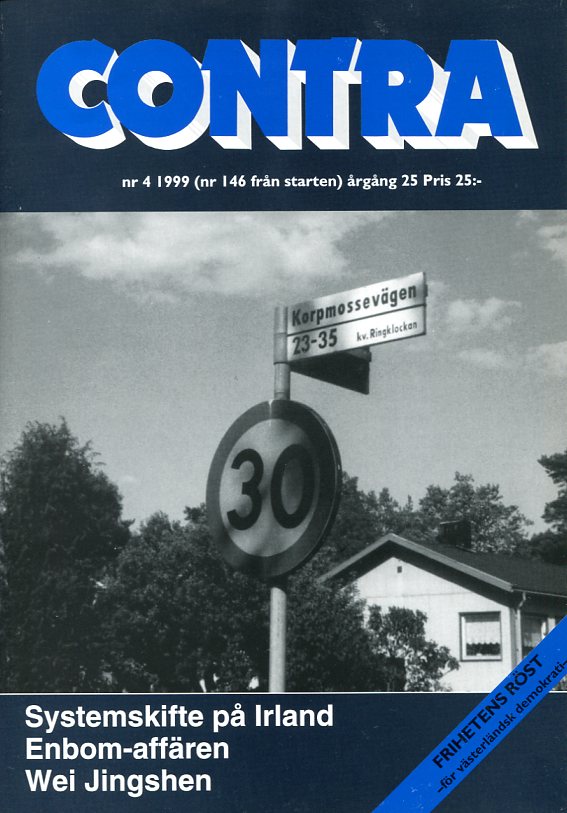
The traitor Stig Wennerström lives in the most fashionable community in Sweden
Only a stone’s throw from the most expensive address in Sweden, Strandvägen in the exclusive Stockholm suburb of Djursholm, a street where several billionaires have their houses, you will find the top class condominium for elderly people, Gandvik. The proper address of Gandvik is not Strandvägen, but that really doesn’t that matter when the view of the sea is the same through the well-kept park which goes all the way down to Strandvägen by the sea. Gandvik is the place where the old and rich, that once were able to keep up the large villas in the Djursholm area, move when they need something more modern, more easy to keep in shape and somewhere where they directly can get the extra services that elderly people need. Among residents and partners in the condo you will find the ex-colonel Stig Wennerström and his wife Ulla Greta. Wennerström was sentenced to imprisonment for life as a Soviet spy, but was released after only eleven years in 1974. Now he is 93 years old and earns (together with his wife) close to 100.000 dollars a year and has an assessed wealth of 400.000 dollars.
The Enbom spy case: Swedish communists were prepared making sabotage
During the 1950s, when the Communists in Sweden were less influential than they are today, several were prepared to – from within – sabotage among other defence installations in the fortresses of Boden in northern Sweden, in the case of a Soviet attack. Everything is well documented in court proceedings when Enbom and others were sentenced to imprisonment for life.
Ireland – the unknown “revolution”
Ireland had, as all other Western states, created a comprehensive welfare system during the post-war era. As a matter of fact the Irish were among the worst. In 1985 Ireland topped the list of high government expenditures in the OECD, only passed by Sweden, Denmark, Belgium, the Netherlands, New Zealand and France. But in the mid 80s Ireland had a severe financial crisis. The total production, GNP, dropped, unemployment exceeded 20 per cent, inflation was in two digits, government debt exploded because of large deficits and all asked when Ireland had to turn to the International Monetary Fund (IMF) for assistance. The crisis, however, made politicians in Ireland realize that they had to take radical measures in order to cope with the problems. They couldn’t go on increasing taxes and government expenditures. The government concluded an agreement with the employers, the trade unions and the agricultural sector. Public expenditure was radically cut, taxes were lowered (especially payroll taxes and corporate taxes), low wage increases (partly compensated by tax cuts), increase of higher education and in general better conditions for business. As a consequence of these measures the Irish economy started a period of rapid growth. In the late 80s and during the 90s annual growth has reached 5 to 6 per cent a year.
Little Oleg hopes for a future in Sweden
Seven year old Oleg Kovalj, a Russian from Uzbekistan, came to Sweden together with his parents last year. He is deaf after maltreatment in a hospital as a baby in his native country. In Sweden he has, for the first time, got professional help and the boy, that used to be labelled as retarded is now regarded as normally developed for his age. Now the Swedish imigration authorities want to expell the entire Kovalj family to Uzbekistan, where his father is regarded as a criminal, as he has deserted the Uzbek army in order to avoid expected duty in the civil war of Aghnaistan where Uzbekistan takes an active part.
The social democrats spied on the Swedes
Illegal wire tapping of policemen and other suspects. Social democratic control and surveillance. Mismanagement of the murder investigation after the assassination of prime minister Olof Palme opened the opportunities for amateur detectives. Former secret police officer Stig Johansson elaborates on how existing legislation has been misused as a background to Justice Secretary Laila Freivalds’ proposal for increased rights for wire-tapping and bugging.
Wei – alone against the Peking regime
The most well-known Chinese dissident and activist is named Wei Jinsheng and was born in 1950. Wei was sentenced to 15 years of imprisonment in 1979, charged for “counterrevbolutionary activities”. In 1993 he was released, half a year before the end of his prison term. Wei was once more impriosned and stayed in jail for a while (after a new 14 year sentence), before he was released and allowed to emigrate to the United States.
Africa of catastrophes
When the former colonies were granted independence during the 1960s many predicted that leaders such as Kwame Nkrumah in Gahan, Jomo Kenyatta in Kenya, Julius Nyerere in Tanzania and others were going to create affluent, free nations in their respective countries. These hopes turned into disaster. Today fighting takes place from Sierra Leone in the northwest through the vast jungles of Congo towards Sudan and Somalia in the east. Add the civil war in Angola, never taking an end, and the bloody war between Ethiopia and Eritrea.
Income in Africa has dropped and production has declined. Healthcare and education systems decline and corruption and mismanagement grows for every day, ruining the institutions that were created by the former colonial governments. Aids, starvation and genocide have made many African countries worse off than they were at the end of World War II.

